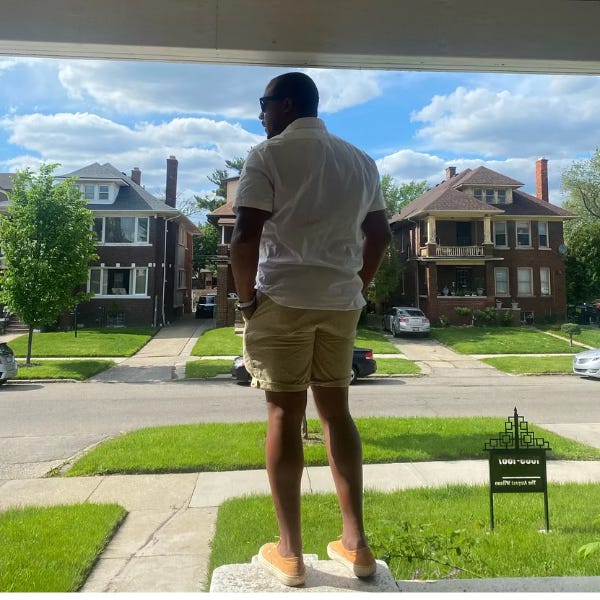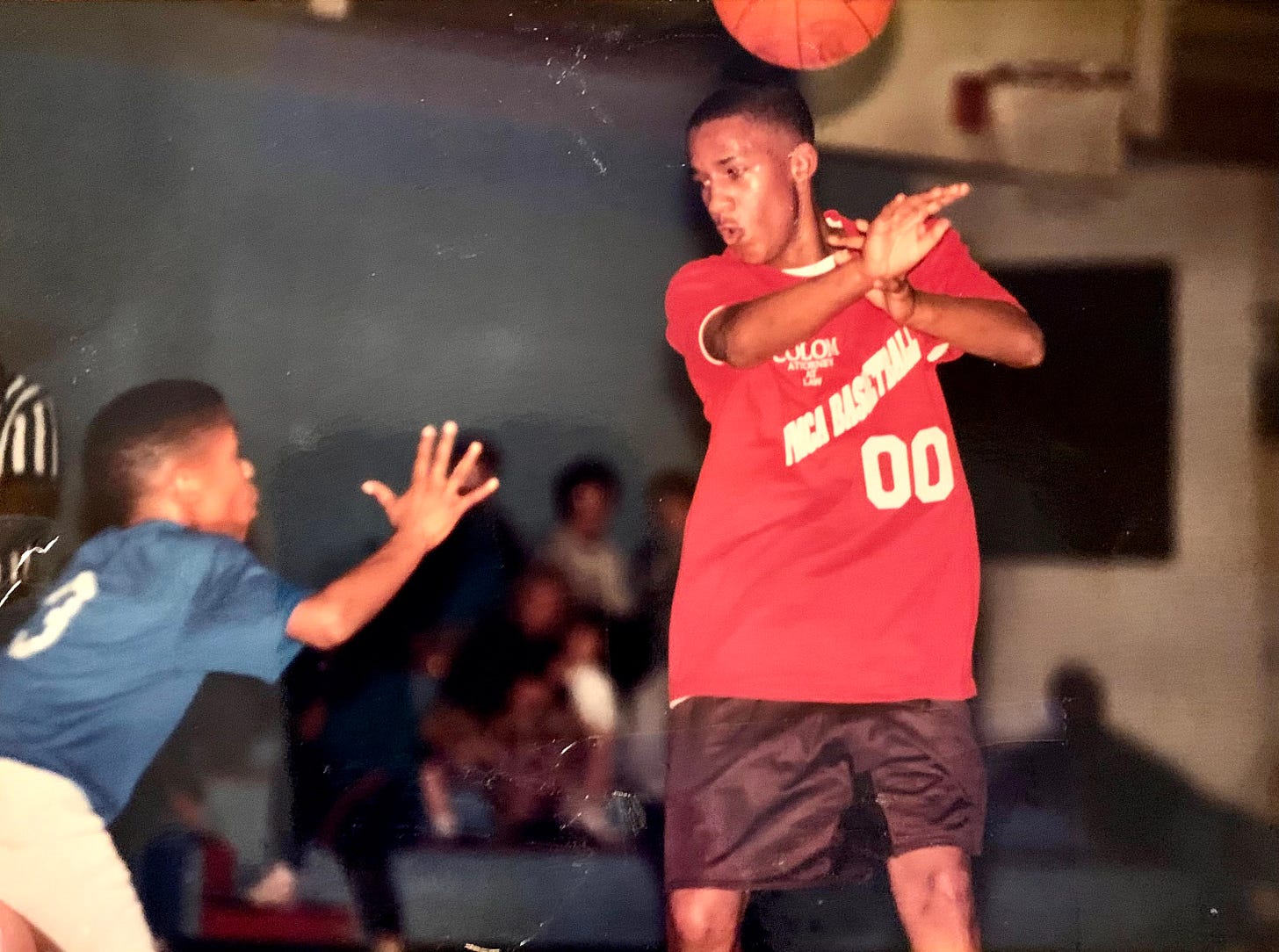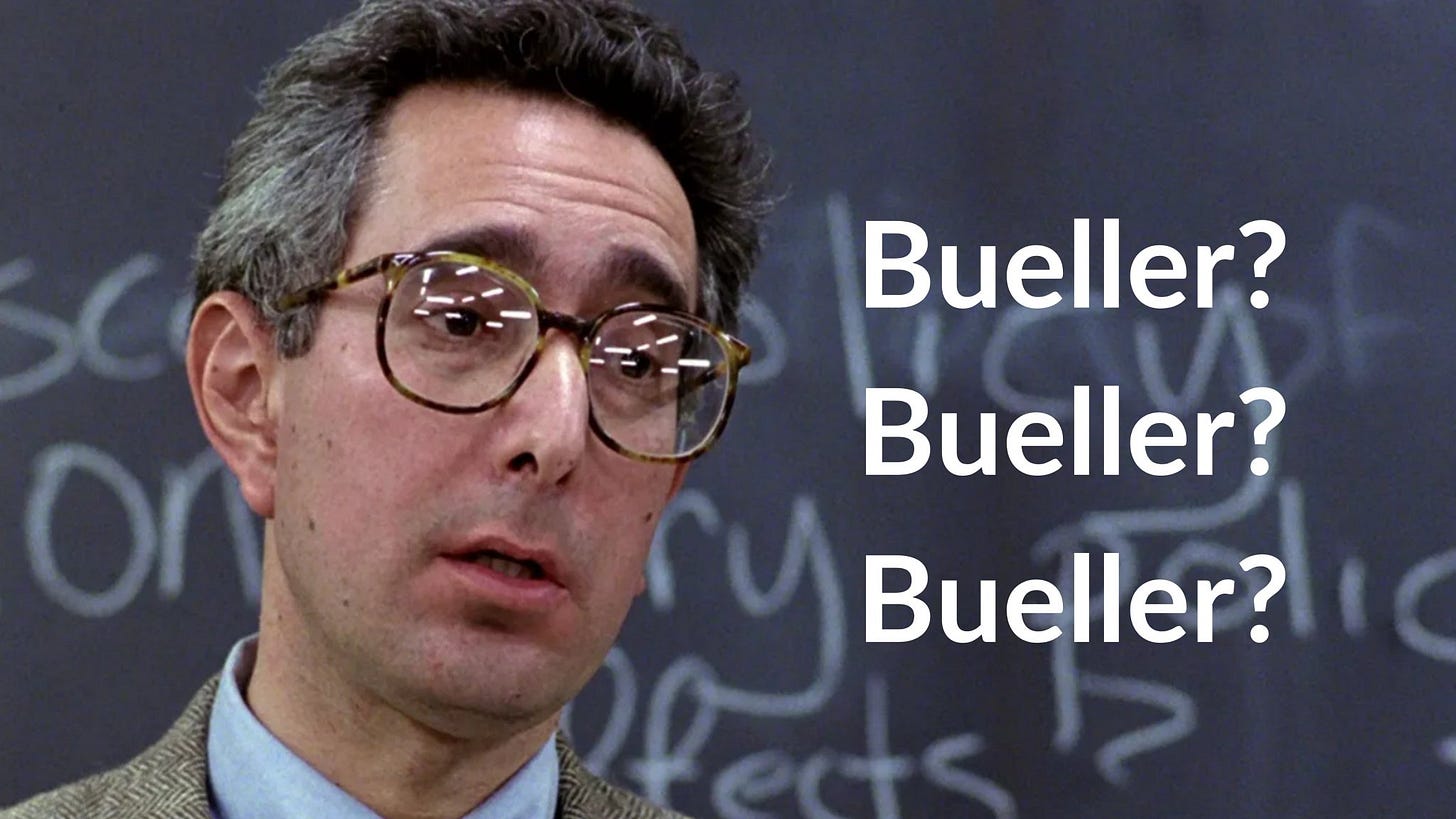An Interview with Andrew Robert Colom
ARC is my brother.
I remember the first time Andrew Robert Colom responded to one of my Notes. I had joked about how I thought the major publishing houses all being located in NYC was a problem (not much of a joke, really—I do think it’s a problem), and I’d tongue-in-cheek listed a number of cities I thought they should be relocated to. Andrew responded with one word, lowercase, no end-punctuation: detroit[.] I was relatively new to Substack, still checking out anyone who responded to anything I wrote. I opened his profile, saw the blue bandana and red background I bet many of you know, and read his self-chosen descriptor. It said, if I recall correctly, that he was ‘the Inventor of Rap Fiction’ and ‘Head Lobster in Charge.’ His post history had some of his own fiction in it. Alright, I thought. Subscribe!
One of the things I learned in the months that followed is that
, as he’s known, does this sort of thing: he vacillates between very brief, lowercased, unpunctuated Notes and long unfurlings of thought and argument. Another thing I learned—or came to realize—is that Andrew is my brother. I say this not in a familial way, obviously, since I met Andrew online and only know him on the internet, and I don’t mean it in any kind of white-guy-thinks-he’s-black-or-thinks-he-can-get-away-with-being-familiar-so-he’s-gonna-call-a-black-guy-his-brother way. What I mean is that Andrew and I are kindred spirits. We’re both fiction writers of a certain taste and stripe: we’re interested in contemporary fiction and the recent modern world. We read a lot of the same writers and have similar sensibilities. We’d both like to make sense of the lives we’re living by writing contemporary literary fiction. When I read his long short story “Beef: Volume 1,” I found myself nodding along to reference after reference after reference—literary, musical, and dude/artist-coming-of-age. When Andrew posted the other day to express his fondness for one of Outkast’s lines, I didn’t even respond: it was too uncanny. It was one of my favorite lines. (Andrew’s musical knowledge, I should say, is far deeper and more encyclopedic than my own.) Andrew hosts flash fiction battles, seeks growth and community-building through confrontation and conflict, and isn’t above talking trash and occasionally trolling people—but if you listen to him closely, he says the word art an awful lot, too, and when you read his work you recognize that behind the easy and occasionally pot-stirring manner he affects, he works meticulously behind the scenes to elevate everything he’s doing to the level of art.A Portrait of the Artist as a Young Baller:
In his piece “I am Everything You Think I am” last week, Andrew’s speaker made significant and meaningful reference to Philip Roth (and Jay-Z, among others), but when I think of Andrew, I think of James Joyce. I say this because I’ve always been a fan of Joyce’s Dubliners as a short story collection that was innovative, darlingly honest, and ultimately enormously influential. It was also a collection that was difficult for Joyce to get out into the world, as many publishers found portions objectionable, but Joyce persevered, finally securing a publisher and a small run of copies. I see similar artistic striving, innovation, and integrity in Colom’s writing when I read stories like “Beef: Volume 1,” “I Gave You Spectacle,” and his innovative, polyphonous pieces like “The Bomb Threat: Substack High” and “Substack High 2.” Andrew recognizes that this platform has the potential to be a new frontier in literature, that there’s a community thing going on, that there are new possibilities of mixing fiction with audio, that he can fictionalize some of the people who will be reading his pieces—and he dives in. One of my favorite pieces by Andrew came out last Thanksgiving, a few weeks after the election: “For the Fulfillment of Righteousness,” a piece in which Andrew hypothesizes a Thanksgiving dinner of conversations between several prominent Substackers. I listened to it in my classroom during my plan period and, though I wasn’t familiar with all of the speakers, and hence couldn’t fully understand it, I thought it was wild. It made me think of Joyce’s “Ivy Day in the Committee Room”: a story in Joyce’s Dubliners consisting of many voices discussing, overtly and between the lines, political issues and sensibilities in Joyce’s Ireland.
Andrew has done me the honor of featuring me in a few of his pieces: he’s fictionalized me in “Substack High: The Bomb Threat” (pairing me up with my now-friend
), he’s interviewed me alongside six other artists in his “Backatcha Episode 1,” and he’s mentioned my book Why Teach? during a ‘commercial break’ in his second episode of “Backatcha.” I desperately wanted to return the favor, and so sent Andrew seven questions in a Voice Memo. I was going to splice my questions and his answers together, but in order to save time, I ultimately decided to cut myself out of the equation and just let Andrew talk. The seven questions I asked him were about identity, the role of conflict in his work, what he thought about a recent quote from Junot Diaz on starting strong and holding momentum, which I referred to as ‘bigness’; his thoughts on the Substack community, his practice of writing long in a world that so often prefers short, his writing multi-voiced ‘polyphonous’ pieces, and what he’s working on now.1 His responses, unscripted and candid, are a pleasure to listen to. I especially enjoyed Andrew’s thoughts on conflict and the moments when he explained how his upbringing has influenced his fiction, and I think that many on Substack might be interested in what he calls ‘post social media fiction.’ There’s a great little bit where he talks about his experience teaching kids to read. My favorite part of the interview, though, by far, is near the end, when he talks about the pieces he’s working on longterm. His voice warms as he begins answering the question, and writers who’ve been there will recognize the enthusiasm one can only have when the work and the writer are truly aligned: when the artist has fallen deeply into their favorite groove. The recording is, in total, twenty-eight minutes. It’s perhaps cheesy to say ARC puts on an excellent class, but as a high school teacher, I can’t stop myself from going after low-hanging fruit, and if you listen to the beginning, I think you’ll understand that Andrew dangled a particularly juicy piece there for me to go after. Enjoy,Peter
The interview:
(For a transcript of the written questions, scroll to the bottom of this page.)
Subscribe to
by clicking his name. If you want to buy my book, you can pick it up at a reduced price from Bookshop.org, B&N, Amazon, Kindle Store, or Kobo until August!The full list of questions, as I sent them to Andrew:
Seven questions for Andrew Robert Colom
Hi Andrew, care to introduce yourself? How should we know you? How do you want to be known?
I’ve heard it said that conflict is the lifeblood of fiction, but conflict seems more important to you than it does to many other writers. You host fiction battles, you challenge other writers in Notes, and one of your most popular stories is called “Beef: Volume 1,” and features a ‘beef’ between the protagonist and Junot Diaz, to say nothing of the other conflicts within the story. Come to think of it, your popular story “I Gave You Spectacle” is about a retired ‘gladiator’ figure—a sentient monster truck. What conflicts and what kinds of conflict are most important to you? And why are you such a fan of conflict?
Speaking of spectacle and Junot Diaz, I recently read a note from Junot--or perhaps an excerpt of one of his recent articles--where he suggests he likes to ‘start big,’ because he not only needs to get his readers’ attention, but needs to get momentum and sustain that attention for the length of a long work. A number of your stories are ‘big’—is bigness important in your fiction? Is there room for ‘small’ or ‘quiet’? If there is, how or what is small and quiet and important to you? If not, why not?
Though you seem to love conflict, you’re also a community builder here on Substack. You’re certainly one of the earliest and most important friends I made on the platform. Can you speak to the tension between your love of conflict and your love of community? What kind of community of writers would you like to help build here? Which ways would you like to see the Substack writing community go?
The world seems to spin faster and faster, and much has been written about our shortening attention spans. On Substack, people write 100-word micro fictions and brief ‘flash fictions’ in spades—but you, like me, seem to be interested in going the other way. Several of your pieces are not only long, but very long, and you have several podcast-style pieces that stretch more than an hour. Can you comment on your impulse to ‘go long’?
Over Thanksgiving last year, you wrote a piece called “For the Fulfillment of Righteousness” in which you ‘did the voices’ of several Substackers, putting theoretical versions of them in conflict with one another. It was a busy time, and I’m not sure I commented on it at the time, but I listened and thought it was a fascinating piece. Is polyphonous the right word to describe what you did there? You did something similar with a few of your ‘Substack High’ pieces. Tell us about your interest in bringing not just a few, but many voices together in your fiction.
Finally, Andrew, tell us what you’re working on now! What can we look forward to from Andrew Robert Colom in the next year? Is it true that you have a big project or two in the works to follow-up "Beef: Volume 1"?






this is so fire! Thanks for the introduction, Peter! Appreciate you highlighting me and my work!
"It's the game." yep